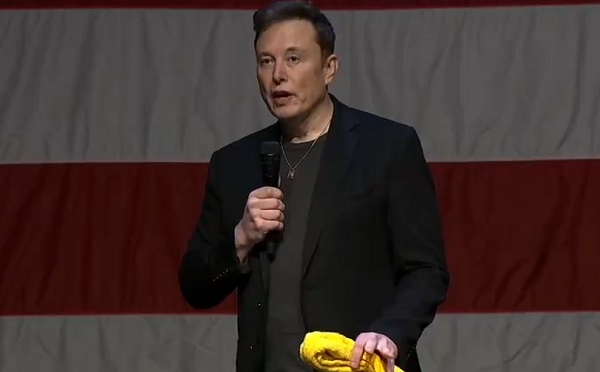Alberta
Trudeau gov’t pushing forward with net-zero regulations despite Supreme Court ruling

From LifeSiteNews
Environment Minister Steven Guilbeault claimed that a Supreme Court ruling returning power to the provinces does not affect federal plans to cap emissions from the oil and gas sector, nor the Clean Electricity Regulations.
The Liberal government is moving ahead with net-zero emission regulations despite a Supreme Court ruling restricting the federal government’s “no more pipelines” legislation.
On October 16, Environment Minister Steven Guilbeault declared that the Supreme Court ruling returning power to the provinces does not affect federal plans to cap emissions from the oil and gas sector, nor the Clean Electricity Regulations.
“The opinion of the court does not call into question other regulatory initiatives under development, and we are confident that they are within the purview of the federal government,” Guilbeault said in a statement to The Globe and Mail.
Guilbeault further claimed that the regulations are within Ottawa’s power to regulate as they are based on different federal authorities than the Impact Assessment Act.
The decision to press ahead with energy regulation comes on the heel of an October 13 ruling by the Canadian Supreme Court which found the Trudeau government’s 2019 Impact Assessment Act (IAA), dubbed the “no more pipelines” bill by critics, to be largely unconstitutional.
The Supreme Court declared that most of the IAA was unconstitutional with the exception of Sections 81 to 91, which refer to projects under federal authority on federal lands or outside Canada. Therefore, those projects would fall under federal jurisdiction and are not unconstitutional for the federal government to regulate.
However, the Court’s ruling did restore provincial autonomy over projects that don’t fall under federal jurisdiction, determining that the Trudeau government’s requirement that all provincial natural resource projects conform to the Liberals’ social and “climate change” policies is unconstitutional.
Guilbeault’s Monday statement comes as Canadians await the federal government’s amendment of the Canadian Environmental Protection Act, which is designed to phase out natural gas plants by 2030. The act is expected to be the means to implement the emissions cap and electricity regulations across the country.
His position echoes that of legal experts who warned that the Supreme Court’s decision will likely have no impact on other federal moves such as the Clean Electricity Regulations or oil sands emissions caps.
However, Guilbeault seems to be backtracking from his initial statement following the Supreme Court ruling; on that day, Guilbeault declared that the federal government is willing to “collaborate” with the provinces.
“We accept the court’s opinion,” he said during a virtual media meeting last Friday. “It provides new guidance on the Impact Assessment Act, while explicitly affirming the right of the government of Canada to put in place impact assessment legislation and collaborate with provinces on environmental protection.”
“We will now take this back and work quickly to improve the legislation through Parliament,” Guilbeault announced, but failed to give a timeline for the new legislation.
Alberta Premier Danielle Smith, a staunch opposer of Trudeau’s net-zero regulations, celebrated the court decision as returning power to the provinces.
“Today’s decision significantly strengthens our legal position,” Smith told reporters. “If they’re [the federal government] trying to pretend that they somehow still have the right to proceed with those offensive pieces of legislation that are clearly in our jurisdiction, they’re fooling themselves.”
Beyond the IAA, Alberta has been consistent in its fight against Trudeau’s push for increased energy regulations, with Smith repeatedly refusing to submit to the Liberal government’s demands, warning that Canadians could freeze in the winter if new “clean” electricity and energy regulations are enforced.
Late last month, Smith announced that she is preparing to use her province’s Sovereignty Act to fight the electricity regulations if the Trudeau government does not relent.
The draft version of the federal government’s “Clean Electricity Regulations” (CER) states that there will be billions in higher costs associated with a so-called “green” power transition, especially in the resource-rich provinces of Alberta, Saskatchewan, New Brunswick, and Nova Scotia, which use natural gas and coal to fuel power plants.
Business executives in Alberta’s energy sector have also warned that the Trudeau government’s fast-paced “green” transition could lead to unreliability in the power grid.
In addition to Smith, Saskatchewan Premier Scott Moe has likewise promised to fight back against Trudeau’s new regulations, saying recently that “Trudeau’s net-zero electricity regulations are unaffordable, unrealistic and unconstitutional.”
“They will drive electricity rates through the roof and leave Saskatchewan with an unreliable power supply. Our government will not let the federal government do that to the Saskatchewan people,” he charged.
The Trudeau government’s current environmental goals – in lockstep with the United Nations’ “2030 Agenda for Sustainable Development” – include phasing out coal-fired power plants, reducing fertilizer usage, and curbing natural gas use over the coming decades.
The reduction and eventual elimination of the use of so-called “fossil fuels” and a transition to unreliable “green” energy has also been pushed by the World Economic Forum (WEF) – the globalist group behind the socialist “Great Reset” agenda – an organization which Trudeau and some of his cabinet are involved.
Alberta
REPORT: Alberta municipalities hit with $37 million carbon tax tab in 2023

Grande Prairie. Getty Images photo
From the Canadian Energy Centre
Federal cash grab driving costs for local governments, driving up property taxes
New data shows the painful economic impact of the federal carbon tax on municipalities.
Municipalities in Alberta paid out more than $37 million in federal carbon taxes in 2023, based on a recent survey commissioned by Alberta Municipal Affairs, with data provided to the Canadian Energy Centre.
About $760,000 of that came from the City of Grande Prairie. In a statement, Mayor Jackie Clayton said “if the carbon tax were removed, City property taxes could be reduced by 0.6 per cent, providing direct financial relief to residents and businesses in Grande Prairie.”
Conducted in October, the survey asked municipal districts, towns and cities in Alberta to disclose the amount of carbon tax paid out for the heating and electrifying of municipal assets and fuel for fleet vehicles.
With these funds, Alberta municipalities could have hired 7,789 high school students at $15 per hour last year with the amount paid to Ottawa.
The cost on municipalities includes:
Lloydminster: $422,248
Calgary: $1,230,300 (estimate)
Medicine Hat: $876,237
Lethbridge: $1,398,000 (estimate)
Grande Prairie: $757,562
Crowsnest Pass: $71,100
Red Deer: $1,495,945
Bonnyville: $19,484
Hinton: $66,829
Several municipalities also noted substantial indirect costs from the carbon tax, including higher rates from vendors that serve the municipality – like gravel truck drivers and road repair providers – passing increased fuel prices onto local governments.
The rising price for materials and goods like traffic lights, steel, lumber and cement, due to higher transportation costs are also hitting the bottom line for local governments.
The City of Grande Prairie paid out $89 million in goods and services in 2023, and the indirect costs of the carbon tax “have had an inflationary impact on those expenses” in addition to the direct costs of the tax.
In her press conference announcing Alberta’s challenge to the federal carbon tax on Oct. 29, 2024, Premier Danielle Smith addressed the pressures the carbon tax places on municipal bottom lines.
“In 2023 alone, the City of Calgary could have hired an additional 112 police officers or firefighters for the amount they sent to Ottawa for the carbon tax,” she said.
In a statement issued on Oct. 7, 2024, Ontario Conservative MP Ryan Williams, shadow minister for international trade, said this issue is nationwide.
“In Belleville, Ontario, the impact of the carbon tax is particularly notable. The city faces an extra $410,000 annually in costs – a burden that directly translates to an increase of 0.37 per cent on residents’ property tax bills.”
There is no rebate yet provided on retail carbon pricing for towns, cities and counties.
In October, the council in Belleville passed a motion asking the federal government to return in full all carbon taxes paid by municipalities in Canada.
The unaltered reproduction of this content is free of charge with attribution to the Canadian Energy Centre.
Alberta
MAiD In Alberta: Province surveying Albertans about assisted suicide policies

Alberta’s government is launching a public engagement to gather input about legislation and policies around assisted suicide, also referred to as medical assistance in dying (MAID).
Medical assistance in dying is a process that allows an eligible person to receive assistance from a medical practitioner in ending their life. To be found eligible, a person must be suffering from a serious and permanent medical condition.
Alberta’s government is reviewing how MAID is regulated to ensure there is a consistent process as well as oversight that protects vulnerable Albertans, specifically those living with disabilities or suffering from mental health challenges. An online survey is now open for Albertans to share their views and experiences with MAID until Dec. 20.
“We recognize that medical assistance in dying is a very complex and often personal issue and is an important, sensitive and emotional matter for patients and their families. It is important to ensure this process has the necessary supports to protect the most vulnerable. I encourage Albertans who have experience with and opinions on MAID to take this survey.”
In addition to the online survey, Alberta’s government will also be engaging directly with academics, medical associations, public bodies, religious organizations, regulatory bodies, advocacy groups and others that have an interest in and/or working relationship to the MAID process, health care, disabilities and mental health care.
Feedback gathered through this process will help inform the Alberta government’s planning and policy decision making, including potential legislative changes regarding MAID in Alberta.
“Our government has been clear that we do not support the provision of medically assisted suicide for vulnerable Albertans facing mental illness as their primary purpose for seeking their own death. Instead, our goal is to build a continuum of care where vulnerable Albertans can live in long-term health and fulfilment. We look forward to the feedback of Albertans as we proceed with this important issue.”
“As MAID is a federally legislated and regulated program that touches the lives of many Albertans, our priority is to ensure we have robust safeguards to protect vulnerable individuals. Albertans’ insights will be essential in developing thoughtful policies on this complex issue.”
The federal Criminal Code sets out the MAID eligibility criteria, procedural safeguards and reporting obligations. The federal government has paused MAID eligibility for individuals with a mental illness as their sole underlying medical condition until March 2027 to ensure the provincial health care systems have processes and supports in place. Alberta’s government does not support expanding MAID eligibility to include those facing depression or mental illness and continues to call on the federal government to end this policy altogether.
Related information
-

 Brownstone Institute17 hours ago
Brownstone Institute17 hours agoThe Most Devastating Report So Far
-

 Economy1 day ago
Economy1 day agoCOP 29 leaders demand over a $1 trillion a year in climate reparations from ‘wealthy’ nations. They don’t deserve a nickel.
-

 Censorship Industrial Complex21 hours ago
Censorship Industrial Complex21 hours agoAnother Mass Grave?
-

 ESG4 hours ago
ESG4 hours agoCan’t afford Rent? Groceries for your kids? Trudeau says suck it up and pay the tax!
-

 Alberta20 hours ago
Alberta20 hours agoMAiD In Alberta: Province surveying Albertans about assisted suicide policies
-

 Energy1 day ago
Energy1 day agoOttawa’s proposed emission cap lacks any solid scientific or economic rationale
-

 Alberta1 day ago
Alberta1 day agoOn gender, Alberta is following the science
-

 International5 hours ago
International5 hours agoElon Musk praises families on X: ‘We should teach fear of childlessness,’ not pregnancy


